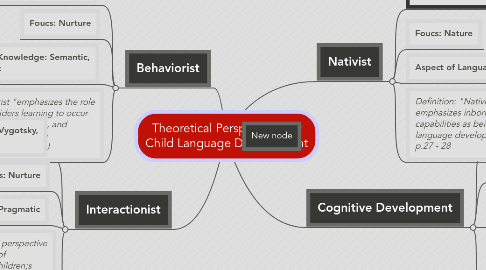Theoretical Perspectives for Child Language Development
Door Rosalma Rocha


1. Behaviorist
1.1. Theorist / Researcher: B.F Skinner
1.2. Foucs: Nurture
1.3. Aspect of Language Knowledge: Semantic, Syntactic, Morphemic
1.4. Definition: Behaviorist "emphasizes the role of nurture and considers learning to occur based on the stimuli, responses, and reinforcements that occur in the environment" (Otto, 2010, p.31)
2. Interactionist
2.1. Theorist / Researcher: Lev Vygotsky, Bruner, & Halliday
2.1.1. Vygotsky basic premise was that "language development is influences by the society in which the individual lives" (Otto, 2010, p.33)
2.2. Foucs: Nurture
2.3. Aspect of Language Knowledge: Pragmatic
2.4. Definition: "the ineractionist perspective focuses on the primary role of sociocultural interaction in children;s development of language knowledge" (Otto, 2010, p. 33)
3. Nativist
3.1. Theorist / Researcher: Noam Chomsky
3.1.1. "Chomsky contends that all people inherently have the capacity to acquire language due to cognitibe structures that process language differently from other stimuli" (Otto, 2010. p.28)
3.2. Foucs: Nature
3.3. Aspect of Language Knowledge:Syntactic
3.4. Definition: "Nativist perspective emphasizes inborn or innate himan capabilities as being resposible for language development" (Otto, 2010, p.27 - 28
4. Cognitive Development
4.1. Theorist / Researcher: Jean Piaget
4.1.1. Piaget conteded that for laguage to exists the "capacity for mental represenation must be present" (Otto, 2010, p.30)
